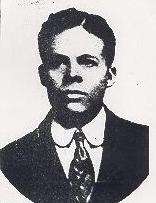George Wells Parker

George Wells Parker (September 18, 1882– July 28, 1931) was an African-American political activist and writer who co-founded the Hamitic League of the World.
His parents were born in Virginia and South Carolina, and his family moved to Omaha when Parker was young. He attended Creighton University and later graduated from Harvard University, one of the first African-Americans to do so.[1] As a Black nationalist and contemporary of Marcus Garvey, Parker's views on Africa as the cradle of civilization foreshadowed increased fascination with Egyptian imagery by African-Americans.
In 1916 Parker started helping African Americans resettle in Omaha and, by 1917, he helped found the Hamitic League of the World to promote African pride and black economic progress.
As a historian committed towards accelerating racial self-awareness, Parker's work called "for the revision of all textbooks that falsified and deleted the truth concerning Black folk".[2] His lecture on "The African Origin of the Grecian Civilization" was delivered to supporters in Omaha and then published in the Journal of Negro History in 1917. Parker argued that new anthropological research had demonstrated that Mesopotamian and Greek civilization originated in Africa. In 1918 the League published his pamphlet "Children of the Sun", which further developed his arguments for the African origins presented in classical Egyptian, Asian and European civilizations. Author, journalist, and historian Joel Augustus Rogers named this publication as a valuable resource for his perspective.[3]
Parker had an ideological counterpart and disciple in Cyril Briggs, a Caribbean-born journalist based in New York City who founded the African Blood Brotherhood. The organizations created by these two men often clashed and collaborated, although the latter leaned decidedly towards [Communistic] content and values.[4] Additionally, the Hamitic League of the World published The Crusader in September 1918,[5] a publication actually edited by Briggs, furthering the involvement of these two groups.
In 1922, Parker moved to Chicago to pursue "Newspaper and magazine work" and died there almost a decade later, leaving a wife, two brothers and two sisters. He is buried at Forest Lawn Cemetery in Omaha.[6]
Notes
- ↑ Yaacov Shavit, History in Black: African-Americans in Search of an Ancient Past, Routledge, 2001, p.41
- ↑ Race and Reparations: A Black Perspective for the 21st Century, Munford, 1996, p. 231
- ↑ Literary Garveyism: Garvey, Black Arts, and the Harlem Renaissance, Martin, 1983, p. 80
- ↑ W.E.B. DuBois, 1919-1963: The Fight for Equality and the American Century, Lewis, 2001, p. 57
- ↑ Ibid
- ↑ "Records of a Day. George Wells Parker. Omaha Evening World Herald, July 31, 1931, p. 18, c. 1.